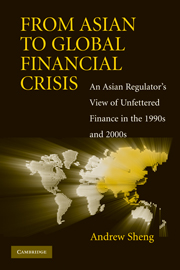 From Asian to Global Financial Crisis
From Asian to Global Financial Crisis Book contents
- Frontmatter
- Contents
- List of Figures
- List of Tables
- Acknowledgements
- Introduction
- 1 Things Fall Apart
- 2 Japan and the Asian Crisis
- 3 The Beam in Our Eyes
- 4 Banking: The Weakest Link
- 5 Washington Consensus and the IMF
- 6 Thailand: The Karma of Globalization
- 7 South Korea: Strong Body, Weak Heart
- 8 Malaysia: The Country That Went Its Own Way
- 9 Indonesia: From Economic to Political Crisis
- 10 Hong Kong: Unusual Times Need Unusual Action
- 11 China: Rise of the Dragon
- 12 From Crisis to Integration
- 13 The New World of Financial Engineering
- 14 What's Wrong with Financial Regulation?
- 15 The Global Financial Meltdown
- 16 A Crisis of Governance
- From Asian to Global Crisis: Chronology of Notable Events
- Abbreviations and Acronyms
- Bibliography
- Index
14 - What's Wrong with Financial Regulation?
Published online by Cambridge University Press: 05 June 2012
- Frontmatter
- Contents
- List of Figures
- List of Tables
- Acknowledgements
- Introduction
- 1 Things Fall Apart
- 2 Japan and the Asian Crisis
- 3 The Beam in Our Eyes
- 4 Banking: The Weakest Link
- 5 Washington Consensus and the IMF
- 6 Thailand: The Karma of Globalization
- 7 South Korea: Strong Body, Weak Heart
- 8 Malaysia: The Country That Went Its Own Way
- 9 Indonesia: From Economic to Political Crisis
- 10 Hong Kong: Unusual Times Need Unusual Action
- 11 China: Rise of the Dragon
- 12 From Crisis to Integration
- 13 The New World of Financial Engineering
- 14 What's Wrong with Financial Regulation?
- 15 The Global Financial Meltdown
- 16 A Crisis of Governance
- From Asian to Global Crisis: Chronology of Notable Events
- Abbreviations and Acronyms
- Bibliography
- Index
Summary
Simply stated, the bright new financial system – for all its talented participants, for all its rich rewards – has failed the test of the market place.
~ Paul VolckerThe consistent complaint from the industry is that their supervisors do not adequately understand their business. And the consistent complaint from regulators is that senior management of financial institutions may not adequately understand the business for which they are responsible.
~ Martyn HopperWhat role did financial regulation play in this crisis?
I start by stating what I presume to be obvious: in today's democratic environment where the people expect governments to protect their savings, zero financial regulation is not an option. As FT columnist Martin Wolf shrewdly observed: ‘The public, governments feel, must be protected from banks and banks must be protected from themselves. Finance is deemed far too important to be left to the market’.
But financial regulation is not yet a science, even though much of it has been explained in economics that claims to be a science. When I first tackled the failure of deposit-taking cooperatives in Malaysia in the mid-1980s, the only book I could find of practical use in handling bank runs remained Walter Bagehot's Lombard Street. Even today, there are few books on financial regulation, and it is scarcely taught in universities. Largely, it has been learnt on the job.
- Type
- Chapter
- Information
- From Asian to Global Financial CrisisAn Asian Regulator's View of Unfettered Finance in the 1990s and 2000s, pp. 350 - 374Publisher: Cambridge University PressPrint publication year: 2009


